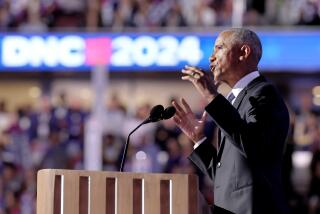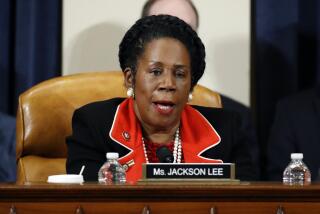DeLay, ‘the Hammer,’ Goes Out With a Bang
WASHINGTON — Former House Majority Leader Tom DeLay bid farewell to the chamber Thursday the same way he wielded his power for more than a decade -- by attacking Democrats and making no apology for partisanship.
“You show me a nation without partisanship, and I’ll show you a tyranny,” DeLay (R-Texas) said in a speech on the House floor.
Only a few dozen Democrats attended the beginning of the speech, and most walked out as DeLay launched into a scathing attack on liberalism.
“In any place or any time on any issue, what does liberalism ever seek?” he asked. “More -- more government, more taxation, more control over people’s lives and decisions and wallets.”
He also asserted that “the common lament over the recent rise in political partisanship is often nothing more than a veiled complaint instead about the recent rise of political conservatism.”
DeLay, who earned the sobriquet “the Hammer” for the aggressive tactics he employed to promote conservative causes and enforce party discipline within GOP ranks, was indicted in September in Texas on charges he violated the state’s campaign finance laws.
As required by Republican House rules, DeLay at that point stepped down from his leadership job, but he made clear he anticipated being cleared and reclaiming his post.
But in January, the guilty plea to federal corruption charges entered by lobbyist Jack Abramoff turned DeLay into a political liability in the view of many Republican lawmakers. DeLay and Abramoff were once close associates, and two of DeLay’s former aides also have pleaded guilty in the corruption case.
Faced with no quick resolution of the Texas case and an increasingly tough reelection campaign, DeLay announced his retirement in April. It takes effect today.
In his House speech, he made only a fleeting reference to the legal woes surrounding him. He insisted he had performed his duties “honorably and honestly, as God is my witness.”
In defending the hardball brand of politics he practiced and, for many, came to symbolize, he said that partisanship, “properly understood, is not a symptom of a democracy’s weakness, but of its health and strength -- especially from the perspective of a political conservative.”
DeLay criticized moderates for valuing compromise over principles.
“It is not the principled partisan, however obnoxious he may seem to his opponents, who degrades our public debate, but the preening, self-styled statesman who elevates compromise to a first principle,” DeLay said.
True statesmen, he added, “are not defined by what they compromise, but what they don’t.”
Republicans greeted DeLay with a standing ovation as he opened his speech, as did the Democrats in the chamber. But as his remarks became more incendiary and Democrats exited, the Republicans largely held their applause -- except when DeLay introduced his wife, who was in the gallery, and praised the Capitol Police.
One Democrat who stayed to the end was Rep. Jesse Jackson Jr. (D-Ill.). He also was one of the few Democrats who crossed to the Republican side of the chamber after the speech, giving DeLay a hug.
Jackson said he thought walking out was “not in the best interests of class.”
“Tom is probably the strongest and the most important symbol for his conservative values,” Jackson said. “While many Democrats were offended by his acrimony to our principles, there was something to be learned from his comments here today.”
He added that DeLay “stood up for his principles today. Democrats have not expressed their core principles to the same degree.”
DeLay, 59, was first elected to the House in 1984, from a district encompassing Houston suburbs. At the time, Democrats had controlled the chamber for three decades, often by huge majorities. House Republican leaders were known for their collegial relations with their Democratic counterparts.
Referring to those political dynamics, DeLay said he had no nostalgia “for the days of a timid, docile and permanent Republican minority.”
When the GOP won the House in 1994, DeLay drew upon support he had cultivated by campaigning and collecting contributions for other Republicans and won a closely contested race for majority whip.
He became majority leader eight years later.
Perhaps more than any other lawmaker, he set the tone for the Republican-led Congress, pushing it to embrace a combative approach in promoting GOP interests and in dealing with Democrats.
He was a driving force in the impeachment of President Clinton. He was the chief architect of the so-called K Street Project, which sought to pressure lobbying firms to hire Republicans and contribute to GOP candidates while having little to do with Democrats. And he masterminded a redrawing of congressional boundaries in Texas that resulted in significant GOP electoral gains.
On Thursday he mentioned only one aspect of his career that he would change: “I would fight even harder.”
House Minority Leader Nancy Pelosi (D-San Francisco) did not attend DeLay’s speech and told reporters she objected to the chamber’s business being interrupted for it.
“I think a large part of his legacy will be a culture of corruption that he built here,” she said.
More to Read
Sign up for Essential California
The most important California stories and recommendations in your inbox every morning.
You may occasionally receive promotional content from the Los Angeles Times.










